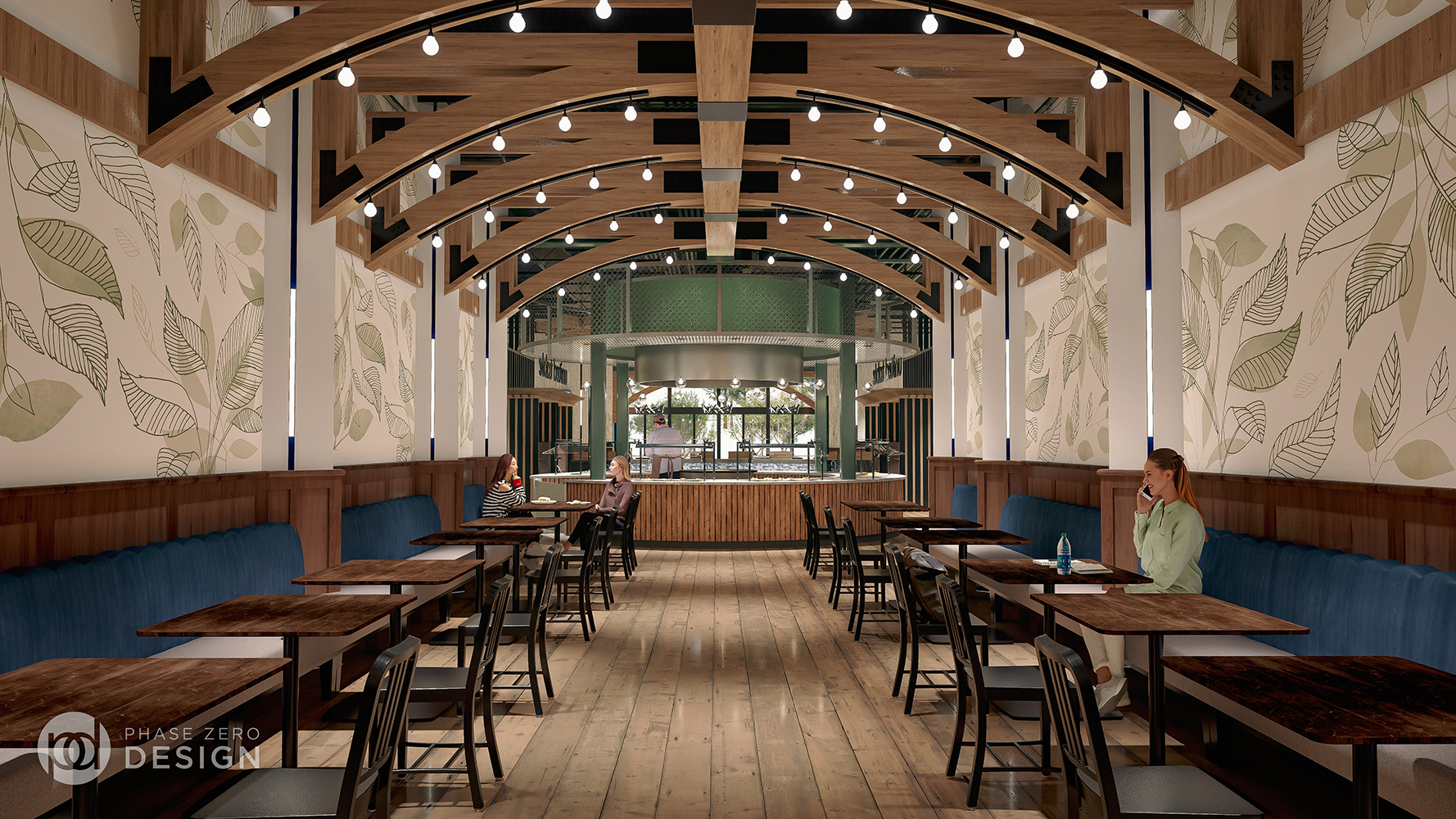Images Courtesy of Chartwells
Connecticut College announced via email on April 9 that the College will be outsourcing its dining operation, concluding a long process in which multiple options were considered. First, and most importantly, this does not mean that current Dining Services staff will be laid off nor that student coffee shops will no longer be student run. This means that a specialized large-scale dining company—Chartwells—will be assisting the College in a partnership to manage the function of feeding students, hiring and training staff, and sourcing our food suppliers.
Currently and throughout Conn’s history, the College has relied on “in-house dining.” This means that the College has hired and trained staff, located food suppliers, and developed menus itself. Outsourcing would allow the College to delegate these tasks to a company with these tasks being its specialty. An external dining services company comes with a large team of staff off campus that have the means to develop new technology, training, and extend the Dining Services network of connections. The College’s Health Services operates an outsourced model with Hartford Healthcare.
The Chartwells Proposal Executive Summary has a few key sections: staff, Harris & Jane Addams, and Oasis & Humphrey’s.
For staff, as demanded by the College, all staff will be provided with the opportunity to continue their employment on Conn’s campus as employees of Chartwells. The company has declared its intention to present employee offers at their current pay rates. Chartwells has acknowledged that this is a big change for staff and has stated their intention to help with this transition as much as possible. Dining Services employees will no longer be direct employees of the College, but they will be offered the opportunity to keep their job on campus under the direct employment and with the employee benefits of the College’s new dining partner. This position is considered an offer or an opportunity because no employee will be required to stay in their equivalent position if they would not like to be under the direct employment of Chartwells.
Chartwells proposes a “three-pronged approach” to Harris Dining Hall: “better atmosphere, authentic food, and enhanced service,” according to their proposal’s executive summary. Chartwells plans to renovate Harris and incorporate “mobile ordering and kiosks to decrease lines and wait time.” They claim student and community input will be taken into consideration in their renovation plans. In Jane Addams, Chartwells wants to capitalize on a wellness focused cafe that promotes health and sustainability.
Chartwells invisions Oasis as a food hall with options like sushi, salad, pizza, grill, and deli options. For Humphrey’s, they have proposed a mixed alcohol and non-alcohol drink bar with offerings like kombucha, soda, cold brew, and mocktails.
A key question during the exploration of outsourcing as an option has been how an external company will be empowered to do this while our in-house Dining Services has not been equipped with the funds or means, despite the desire to do so. In short, companies like Chartwells have the capital on hand to make larger short-term investments for longer-term pay-offs that the College does not have. The College is not planning any significant alterations to the budget for Dining Services. With the pre-existing network Chartwells has developed over years of specialized provision of dining to higher education institutions, Chartwells claims to have greater spending power with the same capital amount.
Outsourcing with Chartwells does not mean the company now has complete control over Dining Services. The College has made the decision to enter a contract partnership with the company and each aspect of Dining will be a negotiation for the College to ensure Chartwells provides services that are both necessary and compatible for the Conn community. Once a college has decided to outsource a sector of its services, the goal is typically to find a company that will be flexible to the specific needs and wants of that college community and that is what Conn hopes it has achieved.

As explained on their website, Chartwells prides itself on its customized approach. They say, “No campus is the same, so neither are we. We customize every element of the dining experience to reflect the culture and traditions of the campuses we serve.”
The College first explored the question of outsourcing Dining Services in 2017. At that time, they hired Envision Strategies—an independent advisory firm for dining on college and university campuses—to assess the in-house Dining and Catering Services. Envision Strategies determined that there were several areas of Dining that had room for improvement that an external company could address. Their recommendations were to consolidate operations, improve efficiency, upgrade the dining experience, increase professionalism, and invest in facility renewal. The College itself also saw a need to implement more advanced technology for employees and students.At the time, however, the cost of outsourcing was more than the College was able to afford.
Since then, the College has worked to internally address some of the areas identified by Envision Strategies and its internal evaluation. A list of these new strategies can be found in the addendum to the email sent on April 9.
Continually, student feedback to the College through the Student Government Association (SGA), senior surveys, and direct communication revealed that students were less than entirely satisfied with their dining experience on campus. Improvements to dining were one of the top three areas in need of change identified in the senior survey. Given this feedback, in the spring of 2023, former President Katherine Bergeron tasked Vice President for Human Resources and Organizational Development Reginald White and Dean of Students Victor Arcelus with once again exploring the potential of outsourcing Dining Services.
The question to assess was: Can the College improve the dining experience for students more with the budget currently allocated to Dining Services by itself or with an external dining partner? The goal, if ultimately outsourcing, would be to leverage industry expertise to improve our facilities, equipment, and technology to empower our staff with the tools and training to provide our students with an improved dining experience that is competitive with our peers, according to the future of dining addendum attached in the aforementioned email.
The effect of the COVID-19 pandemic changed a number of industries around the world including the dining and hospitality industry. Given that dining for a higher education institution is a multimillion-dollar operation and the College has never pursued a full, official Request for Proposal (RFP) process, and that at the time of Bergeron’s assignment of the task to White and Arcelus the College did not have a long-term Vice President for Finance and Administration, White and Arcelus determined that partnering once again with Envision Strategies would be necessary.
Envision Strategies assist White and Arcelus with the development of the RFP. An RFP is a document that announces an institution’s intention to explore the potential of outsourcing one of its operations. It is like posting a job opening without the guarantee that the position actually needs to be filled or that anyone would actually be hired. The RFP both provides information about the institution and declares its needs in a potential partner. In Conn’s dining RFP, for example, the College stated that it wanted to retain all current Dining Services employees and would not accept an offer that proposed to replace current staff with externally-sourced company staff.
Envision Strategies met with the SGA General Assembly on May 4, 2023 to consult with the student representative body about the process. On that same day, White sent a message to the campus community announcing the RFP process was underway and asking for feedback on the current dining experience and for aspirations for the future of the dining operation.

In order to evaluate the proposals (applications) received, the College formed a dining committee with students, staff, and faculty. In addition to White and Arcelus, General Manager of Dining Services and Interim Director of Dining Services Christopher Manfredi, Director of Auxiliary Services (Catering) Merrill Collins, Director of Wellbeing and Health Promotion CC Curtiss, Directory of Accessibility Services Jill Heilman, Katherine Blunt Professor of Biology Anne Bernhard, Food Pathway Coordinator Rachel Black, Harkness House Senator Rosemary Bonadies ‘26, Earth House Senator (and then Chair of Academic Affairs) Adrien Landon ‘25, Student-at-Large Max Eikinas ‘27, and Student-at-Large Cole Eichler ‘26 were also on the committee and had the opportunity to review each of the detailed proposals submitted by the three finalists: Chartwells, Sodexo, and Aramark.
Members of the committee read the detailed proposals, attended the in-person presentations and tasting events, and conducted on-list and off-list references with institutions currently partnered with each of the finalist companies. Throughout the process, White and Arcelus attempted to reiterate to the campus as much as they could that partnering with a dining company would not lead to people losing their jobs, but, naturally, many people continued and still continue to have concerns about this.
After narrowing the decision down to two finalists, White and Arcelus met with the Priorities Planning and Budget Committee to finalize the details of the financial agreement between the College and the companies. To the cabinet and the Board of Trustees, they made their final recommendation to partner with a vendor. They said, “it has become clear to us that outsourcing will provide the opportunity for an infusion of expertise, technology, training, development, capital investment, and funding to improve upon our existing dining program and greatly enhance the student experience.”
On March 27, White and Arcelus informed the Dining Services staff and committee that a decision based on campus feedback was made to outsource the dining operation, but there was not yet a decision regarding the particular vendor. In this communication, they wrote, “The partnership will also provide the financial support necessary to make critical improvements to our dining facilities in order for the College to remain competitive with the offerings of other institutions.”
Chartwells plans to bring a number of new programs to campus including their Tap It Forward program where students can donate excess meal swipes to students without unlimited meal plans. Though the details are yet to be finalized with the company, it is likely that students with unlimited plans will have a limited number of donate-able swipes. They also plan to establish micro-gardens in Harris Dining and work to support students at Sprout Garden.
Student-run coffee shops will remain student-run, and Chartwells will offer mentorship opportunities with a strong team of professionals in the hospitality industry. They will “extend purchasing opportunities and training for them and provide guidance and support to the extent the college desires [emphasis added],” according to their executive summary.
Chartwells is expected to continue to work with students, servers, and Student Accessibility Services to provide allergen identification and allergen-safe eating options.
Below is a message from Chartwells:
“‘We are honored to begin a new partnership with Connecticut College, and we are dedicated to crafting an innovative dining program that reflects the campus’s values,’ says Eva Wojtalewski, CEO of Chartwells Higher Education. ‘Our team is eager to collaborate with students, faculty, staff, and current dining associates to personalize a dining experience that caters to their needs and preferences. With a commitment to caring for our people, supporting the local community, and creating delicious meals, we look forward to becoming an integral part of the campus community.’”
As a final note, many students on campus were concerned the College would choose to use a food service company that also provides food services to prisons, which would put them in a position to financially benefit from increasing levels of incarceration around the country. Chartwells does not provide dining services to prisons.
On this topic, Chartwells said, “As your partner, we are proud to be the only food service provider that does not have a correctional food service division. Chartwells Higher Education does not and has never managed any food service operations within prisons.”
Naturally, many members of the campus community are apprehensive of the College’s decision to outsource dining. Conn is a small, tightly-knit community with strong feelings of protectiveness that bridge gaps between students, staff, and faculty. Though Chartwells has the means and the potential to offer beneficial opportunities and experiences for staff and students, camels will continue, as they always have, to hold Conn and its partnerships accountable to the community.











This reads like an ad for Chartwells. Wish the reporter had interviewed Dining Hall staff. Only admin’s view is presented. Takes them at their word.
What about the recent unionization efforts of the dining hall staff?